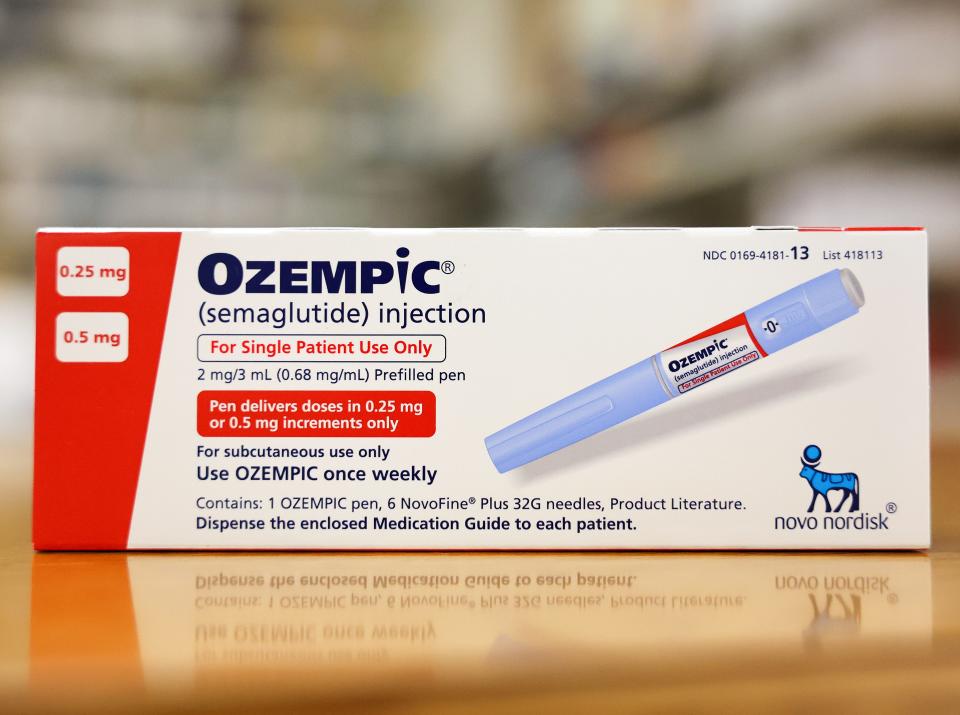Strong obesity medication now available, if you can get it.
People struggling with obesity now have a second, and possibly a more effective, medication option ‒ if they can afford and access the drug.
The Food and Drug Administration Wednesday approved the Eli Lilly drug tirzepatide for people who have obesity. The drug, sold under the name Mounjaro, has been available since last year for people with type 2 diabetes to help improve blood sugar.
The news means that many people who have obesity but not diabetes can, for the first time, get insurance to cover tirzepatide. One expert called the approval a "major milestone" in obesity medicine.
As a treatment solely for obesity, the drug will be called Zepbound.
A similar drug called semaglutide, sold by Novo Nordisk, has been available for several years for people with diabetes, under the brand name Ozempic. For those taking it for weight loss, it's called Wegovy.
All three drugs have been in such high demand that the companies cannot keep up and patients have had trouble accessing them.
Lilly Chairman and CEO Dave Ricks said in a Wednesday news conference that by the end of the year, the company's production capacity will be twice what it was this time last year, with help from a new manufacturing facility in North Carolina and expanded production at other sites. Lilly officials said they foresee additional expanded operations in the future.
"We're investing in manufacturing like never before," Ricks said. "You can't treat the disease without increasing supply."
Supply is adequate right now for Mounjaro, Ricks said, and Zepbound will be available in U.S. drug stores shortly after Thanksgiving.
The list price of Mounjaro is set at just over $1,000 a month, though insurance often covers the cost of treating diabetes. Ozempic sells for about $900 a month, while Wegovy, which tops out at a higher dose of the same drug, sells for about $1,300.
The list price of Zepbound was set at $1,059.87 for all six doses. Lilly says it is putting a commercial savings card program in place that will help people who may benefit from Zepbound better access it.
About one-quarter of private insurers cover the cost of weight loss medications, reducing the cost to as little as $25 for a 1- or 3-month supply; government insurance, including Medicare and Medicaid, does not cover the cost, although federal employees, including members of Congress, now have coverage for weight-loss medications, Lilly officials noted.
Right now, Ricks said, about 5 million Americans are prescribed semaglutide or tirzepatide though about 50 million are believed to meet the criteria for obesity.
"Lilly hopes to fill as much of that as we can. We're working as hard as we can on that," he said.
All three drugs, in a class called incretins, are injected by patients once a week, typically into the abdomen. Semaglutide activates receptors of the hormone GLP-1 (glucagon-like peptide-1) while tirzepatide activates that hormone as well as a similar one called GIP (glucose-dependent insulinotropic polypeptide) to reduce appetite and food intake.
Clinical trials have shown tirzepatide to be extremely effective for weight loss. It has not been compared directly with semaglutide, but, generally, it has brought about greater weight loss in trials.
One tirzepatide trial in people without diabetes showed volunteers taking the highest dose, 15 mg a week, lost as much as 27% of their body weight, which is comparable to or more than the weight loss experienced by patients who undergo bariatric surgery.
Like the other incretins, Zepbound can cause side effects, such as nausea, burping, diarrhea, vomiting, constipation, stomach discomfort and pain, injection site reactions, fatigue, fever, rash, hair loss and gastroesophageal reflux disease.
Patients typically ramp up in six doses of Zepbound from 5 mg to 15 mg over four to 20 weeks, and side effects tend to increase at higher doses. In some cases, they increase, temporarily, with each increase in dosage. Studies show about 10% to 20% of patients drop out of trials because of these side effects, and more people stop the treatment in the "real world," outside of trials, where they likely get less support from doctors.
Diana Isaacs, an endocrine clinical pharmacy specialist at Cleveland Clinic, said the real-world experience with tirzepatide matches what was seen in the trials.

Having a new treatment option has the potential to reverse the increased rates of those with obesity or overweight, she said via email, noting, "Now, we need to make sure that it’s accessible to those that would benefit from it."
Dr. Katherine Saunders, an obesity medicine expert at Weill Cornell Medicine and co-founder of Intellihealth, a company providing software and clinical services for medical obesity treatment, described the approval as a "major milestone in the history of obesity medicine."
When she started practicing, the most effective medications could help people lose 5% to 10% of their body weight. "Wegovy was ground-breaking at 15% and now Zepbound is mind-blowing at 25%."
Diet, physical activity and behavior modifications will always be critical components of weight management, she said via email. People considering the drug must also consult with their providers about their personal and family medical history, current medications, sleep patterns, stress and previous weight-loss experience.
"We need as many tools as we can get in our toolbox of anti-obesity treatments to help our patients manage this complex, chronic disease," she said.
Contact Karen Weintraub at kweintraub@usatoday.com.
Health and patient safety coverage at USA TODAY is made possible in part by a grant from the Masimo Foundation for Ethics, Innovation and Competition in Healthcare. The Masimo Foundation does not provide editorial input.
This article originally appeared on USA TODAY: Obesity med Zepbound, also called Mounjaro, available for obesity

